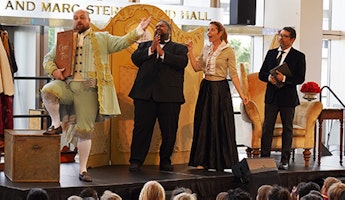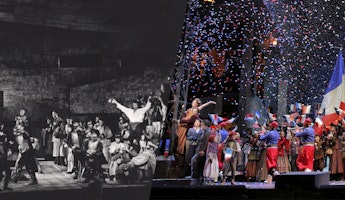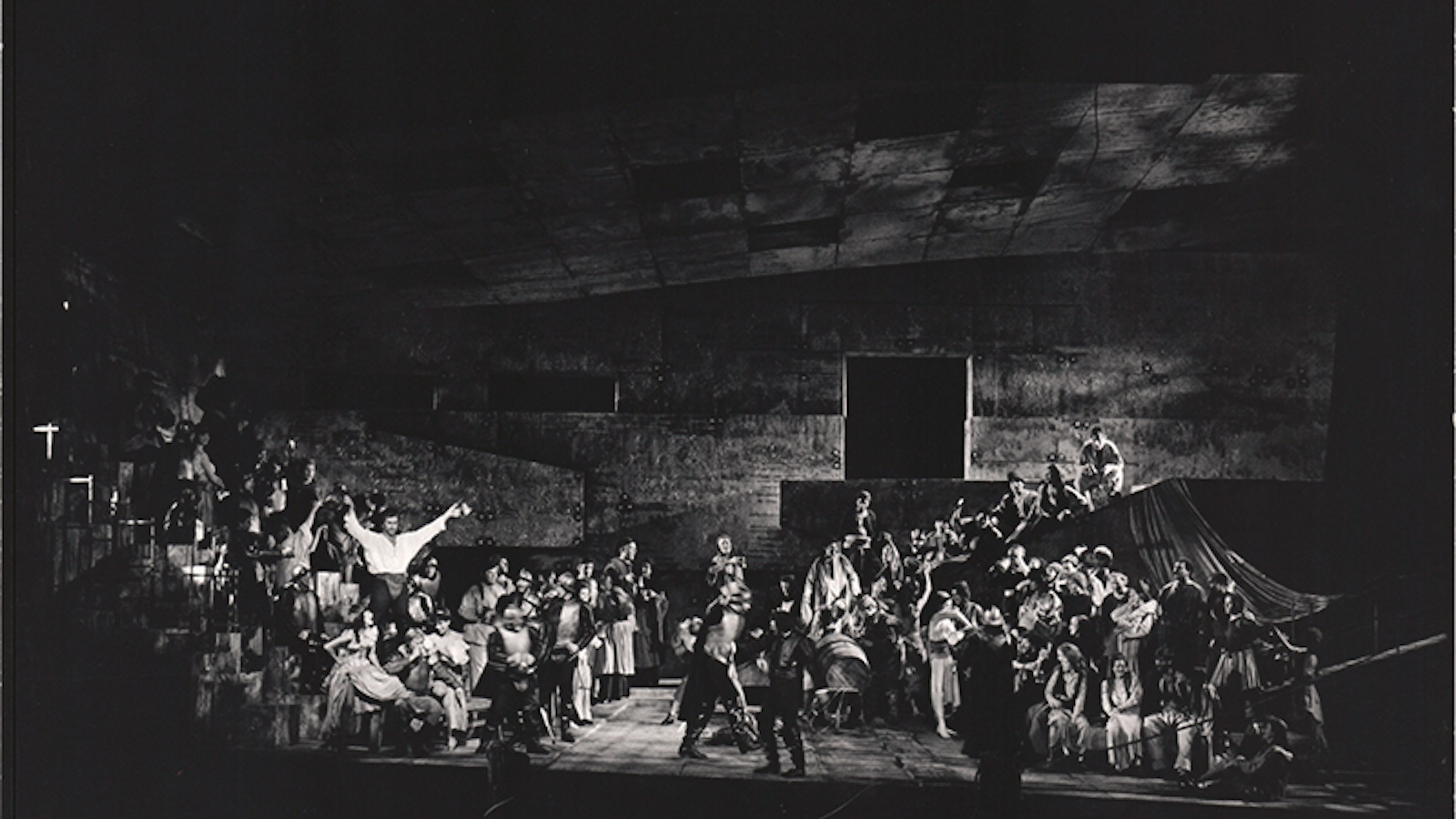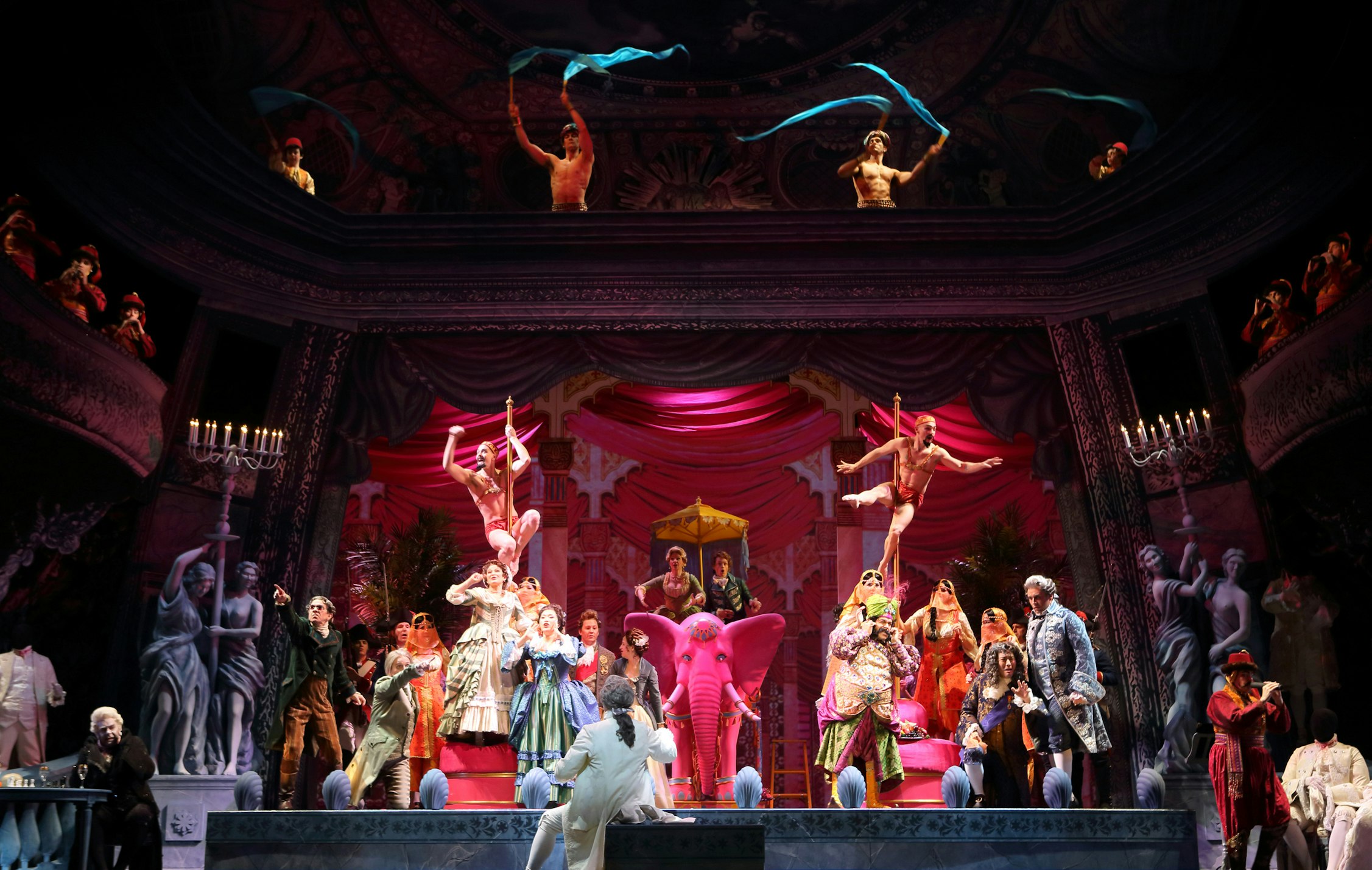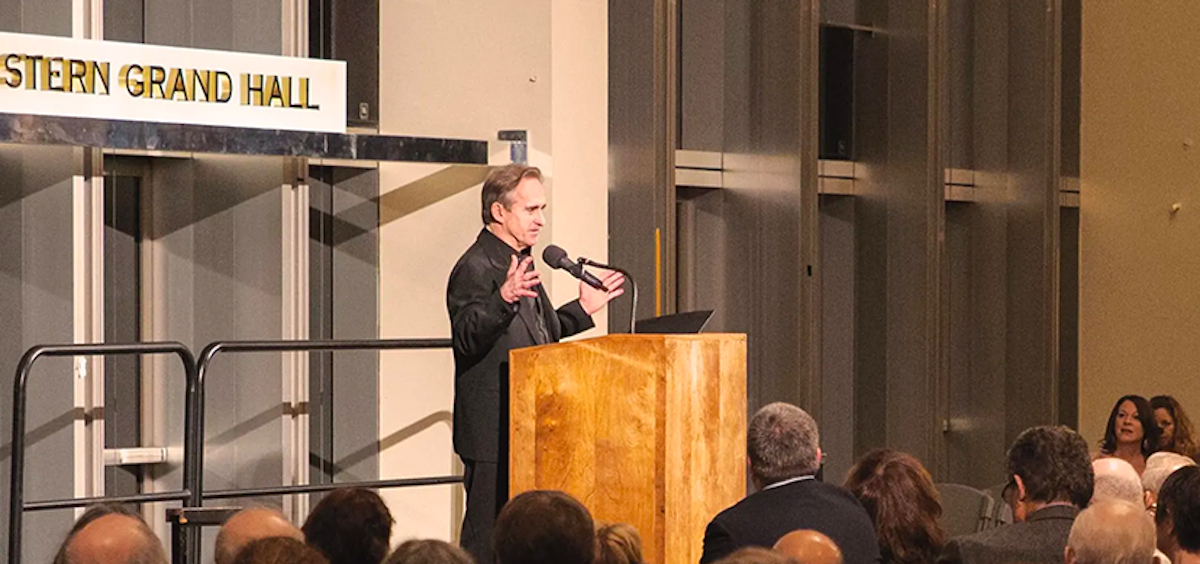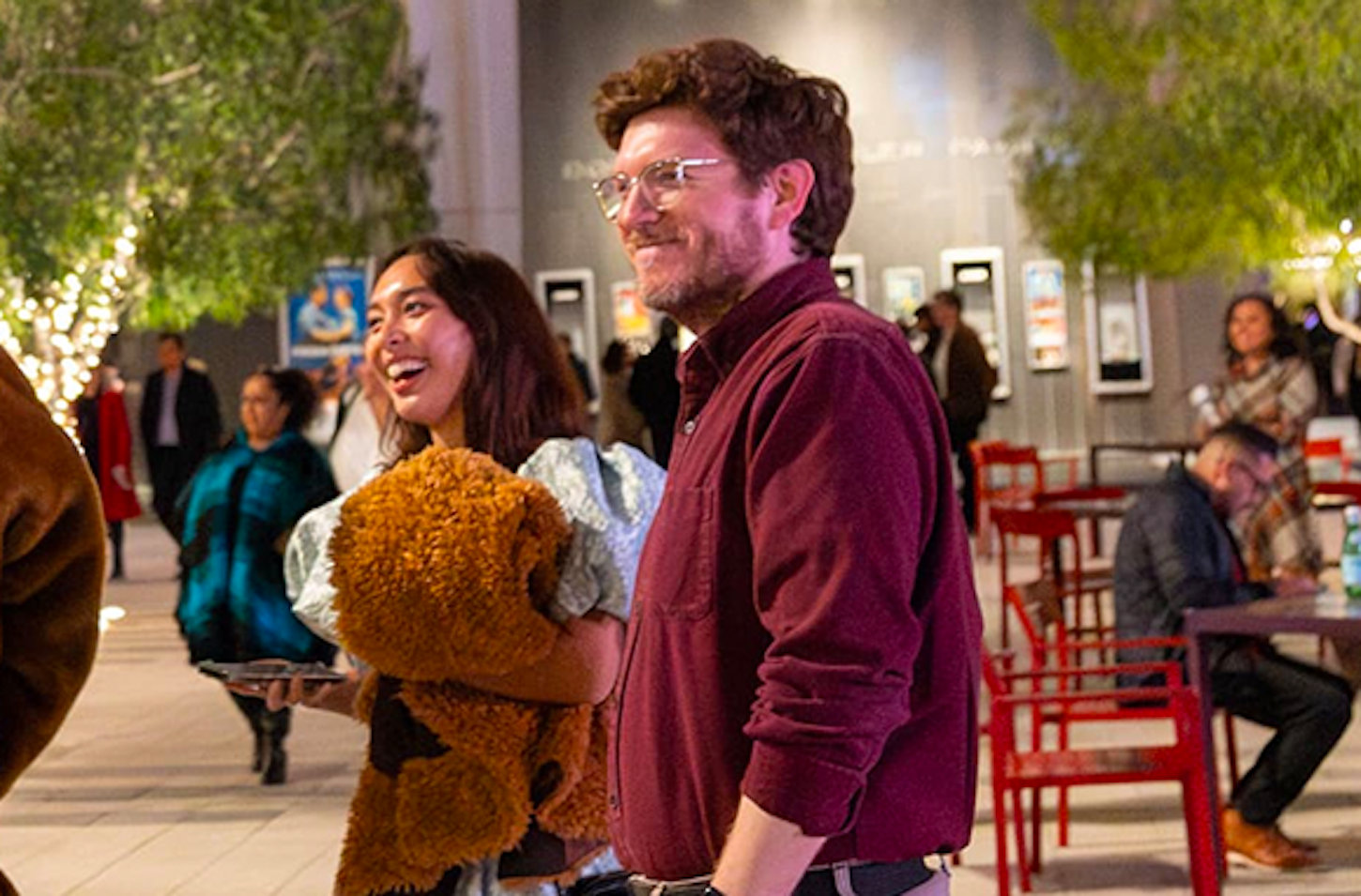You're in good great company! Meet others just like you and gain a deeper understanding of the opera with pre-show talks geared to make sure you get the most out of your experience.
Our Story
In the beginning...
For most of the 20th century, Los Angeles was the only major city in the United States without a resident opera company. Today, it is a vibrant, international opera capital.
In the early 1980s, Los Angeles was undergoing a cultural renaissance as the city prepared to host the Olympics. As part of the 1984 festivities, audiences at the Dorothy Chandler Pavilion had had their first taste of opera on a world-class level during the Olympic Arts Festival, with three touring productions from London’s Royal Opera: Turandot starring Gwyneth Jones and Plácido Domingo, Peter Grimes with Jon Vickers and The Magic Flute with Thomas Allen as Papageno.
Following the incredible success of those performances, a few community leaders got together and decided that it was high time that LA had its own opera company. But not just any opera company. LA Opera’s founders consulted with top leaders in the industry, including Plácido Domingo, to learn how to put together a dream company.
Wasting no time, they hired Peter Hemmings, one of the world’s most respected opera administrators, to create a first-rate opera company in Los Angeles from the ground up. Mr. Hemmings set to work in October of 1984. He began by creating an opera season that launched with the importing an Opera Theatre of Saint Louis production of The Beggar’s Opera to downtown’s Embassy Theater in 1985. Later that year, he brought the Deutsche Oper Berlin to the Dorothy Chandler Pavilion with The Marriage of Figaro, Tosca and Korngold’s Die tote Stadt.
All of this led up to LA Opera’s remarkable inaugural season, a mere two years after Hemmings’ arrival. On October 7, 1986, LA Opera opened its inaugural production of Otello starring Plácido Domingo, Sherrill Milnes and Gabriela Beňačková. This was followed on the two subsequent evenings by the opening nights of Madama Butterfly starring Leona Mitchell and Salome starring Maria Ewing, a production that created a sensation and toured the world.
In the following seasons, LA Opera quickly grew into an internationally celebrated company. Mr. Hemmings stepped down as General Director in 2000 and Plácido Domingo assumed leadership of the company the following season. Mr. Domingo had served as the company's Artistic Consultant from 1984 until 1998, when he was named Artistic Director Designate. In 2003, he was named General Director, a position he held until 2019.
A key component of any world-class opera company is its orchestra. For the company's first several seasons, the Los Angeles Chamber Orchestra (augmented for each production according to the demands of the score) played in the orchestra pit. The LA Opera Orchestra was formed in 1996 and has been the company's resident ensemble ever since. The orchestra has a core roster of 61 musicians, who also fill principal positions in Southern California symphonies and chamber groups, and record in Hollywood film, television and recording sessions. These exceptional musicians provide artistic continuity from production to production and contribute greatly to the high level of LA Opera's artistry.
The company increased its efforts in this area when it hired Kent Nagano as Principal Conductor in the 2001/02 season. In 2003, he was named LA Opera's first ever Music Director. In 2006, James Conlon succeeded Maestro Nagano as Music Director, a position he holds with distinction to this day.
In 2012, LA Opera named Christopher Koelsch as president and CEO to serve alongside Mr. Domingo and Conlon. Mr. Koelsch started with LA Opera in 1997 as an assistant in the artistic department. In recognition of his talents and leaderships skills, he was given increasing levels of responsibility, subsequently holding positions including Vice President for Artistic Planning and then Senior Vice President and Chief Operating Officer.
Upon the resignation of Plácido Domingo in October of 2019, the company’s Board of Directors released the following statement: “After consideration, the LA Opera Board of Directors has decided that the company will remain under the leadership and guidance of Christopher Koelsch, our President and CEO. We are fortunate to be able to centralize our management structure by consolidating the duties of the General Director and President and CEO under a leader like Christopher, whose vision, compassion and dedicated commitment to further expand opera’s presence in Southern California we fully support.”
Breaking New Ground
Presenting benchmark productions of standard repertoire as well as new and rarely-staged operas, the company brings together world-renowned singers, designers, directors and conductors to create opera that attracts the attention of international audiences and critics. With the 2007 launch of the Recovered Voices series, LA Opera became the only major opera company in the world to regularly program the works of composers affected by the Holocaust, including a rare American staging of Zemlinsky's The Dwarf in 2008 and the U.S. premiere of Franz Schreker's Die Gezeichneten [The Stigmatized] in 2010.
In 2010, LA Opera presented its first complete performances of Richard Wagner’s epic Ring cycle, an occasion that was surrounded by Ring Festival LA, a countywide exploration of that work’s enormous cultural impact. The success of Ring Festival LA led to subsequent large-scale festivals: Britten 100/LA (celebrating the centenary of the birth of composer Benjamin Britten) and Figaro Unbound (a three-month celebration of the revolutionary spirit, inspired by the company’s programming of three operas based on Beaumarchais’ Figaro trilogy), with Eurydice Found coming in early 2020, a female-centric festival inspired by the Greek legend and marking the company’s world premiere of Matthew Aucoin’s new opera Eurydice.
The company’s approach to creating seasons is to present a variety of operas. Much like a flight of wines, this allows Angelenos to experience many different types of opera. Seasons include classic favorites, rarely-seen traditional gems, and modern operas, most of which are presented through Off Grand programming.
Pre-Performance Talks for the 2024/25 Season
Join us one hour prior to showtime for a pre-show talk, an enormously popular highlight of the LA Opera experience. You'll learn about the history and plot of the opera, as well as key musical moments to look forward to.
True or False? Opera Tickets are the most expensive thing in town.
FALSE. We’re lower than any major concert or sporting event. Way lower. Check for yourself.
Community & Learning
We've got tons of programs to make sure everyone has access to opera at little or no cost. (And by everyone, we mean everyone.) In addition to providing opportunities to see opera on our main stage, we have lots of programs for young children and community performances throughout the city.
FREQUENTLY ASKED QUESTIONS
Podcasts & Videos

Dive into the magic of LA Opera with experts, artists and fans.

Sumérgete en la magia de la ópera con expertos, artistas y fans.

Saturday Mornings at the Opera & Other Events
Introduce your family to the magic of opera. From a bed of pillows, children enjoy an interactive, family-friendly opera under the glittering chandeliers of the Dorothy Chandler Pavilion. The whole family will make lasting memories and have an unforgettable experience.






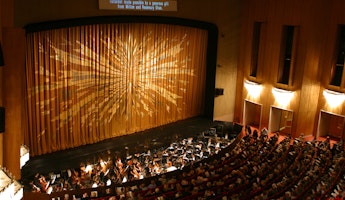

/03-cosi/_dsc0996_pr.jpg?format=auto&fit=crop&w=345&h=200&auto=format)
